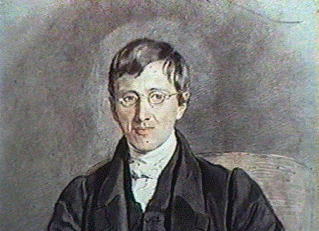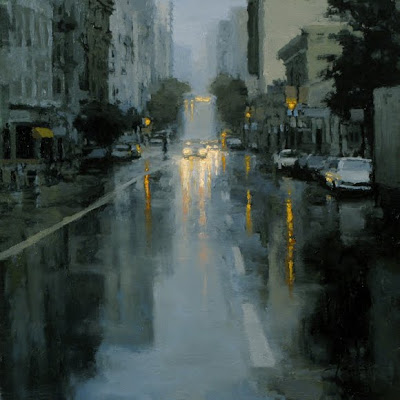Nerval, "Adrienne"
 Sunday, June 13, 2010 at 00:47
Sunday, June 13, 2010 at 00:47 A prose poem ("Adrienne") by this French man of letters. You can read the original as part of this collection.
I regained my bed but could not find any rest. Plunged in half-somnolence, I watched reels of my entire childhood cascade through my memory. This state, in which the mind continues to resist odd combinations in dream, often allows one to see – if hurriedly in only a few minutes – the most striking paintings one may ever behold.
I imagined a castle in the times of Henri IV, its pointed roofs covered in slate and its reddish front with jagged corners of yellow stone; a large green clearing then appeared, framed in elm and lime trees whose foliage was pierced by the setting sun and its flaming strokes. Young girls danced around the lawn singing old tunes inherited from their mothers, in a French so naturally pure it might have still existed in the old Valois country where for over a thousand years the heart of France had beaten.
 In this circle I was the only lad. Here I had brought a companion, still very young as well, Sylvia, a little girl from a neighboring hamlet, so alive and so fresh, with black eyes, a straight, neat profile and her skin lightly tanned! I loved nothing but her, I could see nothing but her – until now! I had just noticed in the circle in which we were dancing a blonde girl, tall and lovely, who was called Adrienne. All of a sudden, in accordance with the rules of the dance, Adrienne found herself alone with me in the middle of the circle Our heights were identical. We were told to embrace, with the dance and choir now more vivacious than ever before. In kissing her I could not help but squeeze her hand. Her long flaxen curls caressed my cheeks. From that moment on a hitherto unknown concern took hold of me. My beauty had to sing to gain the right to rejoin the dance. We sat around her and, just as quickly, in a voice both fresh and penetrating, almost lightly misted like the voices of girls from those hazy parts, she sang one of those old romances replete with love and melancholy. It was a song typical of a princess incarcerated in a tower by her father who wished to punish her for having loved. The melody stopped at each stanza for quavering trills that so enhance a young voice when, by modulated thrill, it imitates the trembling song of its foremothers.
In this circle I was the only lad. Here I had brought a companion, still very young as well, Sylvia, a little girl from a neighboring hamlet, so alive and so fresh, with black eyes, a straight, neat profile and her skin lightly tanned! I loved nothing but her, I could see nothing but her – until now! I had just noticed in the circle in which we were dancing a blonde girl, tall and lovely, who was called Adrienne. All of a sudden, in accordance with the rules of the dance, Adrienne found herself alone with me in the middle of the circle Our heights were identical. We were told to embrace, with the dance and choir now more vivacious than ever before. In kissing her I could not help but squeeze her hand. Her long flaxen curls caressed my cheeks. From that moment on a hitherto unknown concern took hold of me. My beauty had to sing to gain the right to rejoin the dance. We sat around her and, just as quickly, in a voice both fresh and penetrating, almost lightly misted like the voices of girls from those hazy parts, she sang one of those old romances replete with love and melancholy. It was a song typical of a princess incarcerated in a tower by her father who wished to punish her for having loved. The melody stopped at each stanza for quavering trills that so enhance a young voice when, by modulated thrill, it imitates the trembling song of its foremothers.
As she sang darkness descended from the large trees, and the nascent moonlight retrieved her alone, isolating her from our tight little circle. She fell silent, and no one dared interrupt her wordlessness. The lawn was covered with weak condensed vapor which unraveled its white flakes upon the grass blades. We thought that we were in paradise. Finally I got up and ran along the castle's terrain where laurel trees were planted in great monochrome earthenware vases. I brought back two branches which were then woven into a crown and bound with a ribbon. Upon Adrienne's head then I placed this ornament whose lustrous leaves flashed on her blond hair in the pale streams of moonlight. She resembled Dante's Beatrice who smiled at the poet straying along the outskirts of saintly abodes.
Adrienne rose, drawing her svelte figure to its full height. To us she bade a gracious farewell and ran back into the castle. We were told that she was the granddaughter of one of the descendents of a family allied to the ancient kings of France; the blood of Valois coursed through her veins. For this holiday she had been allowed to take part in our games; we would never see her again since she left the following day to a convent where she was a resident.
When I returned to Sylvia's side I noticed that she was crying. The crown given by me to the beautiful singer had been the cause of her tears. I offered to gather her another, but she protested that she was not keen on such a gift nor did she deserve it. In vain I sought to defend myself, but she said not a word more to me as I took her back to her parents' house.
Returning to Paris to resume my studies, I bore this double image of tender friendship sadly broken and a vague and impossible love, a source of dolorous thoughts that university philosophy proved unable to assuage. The figure of Adrienne remained only triumphant, the mirage of glory and beauty, softening or sharing the hours of grueling learning. On vacation the following year I learned that this beauty hardly espied had just been consecrated by her family into the monastic life.
 Nerval in
Nerval in  French literature and film,
French literature and film,  Translation
Translation 



